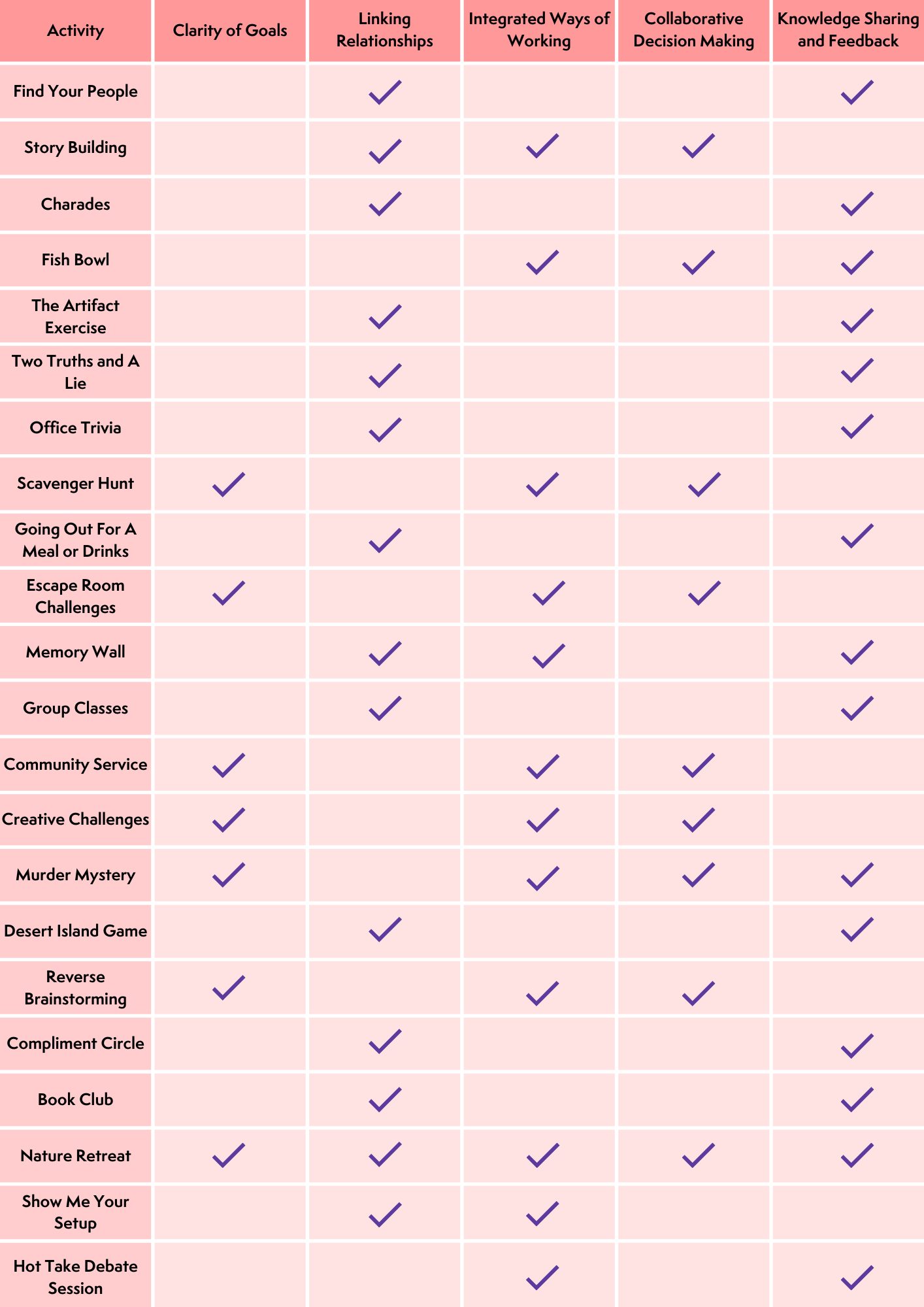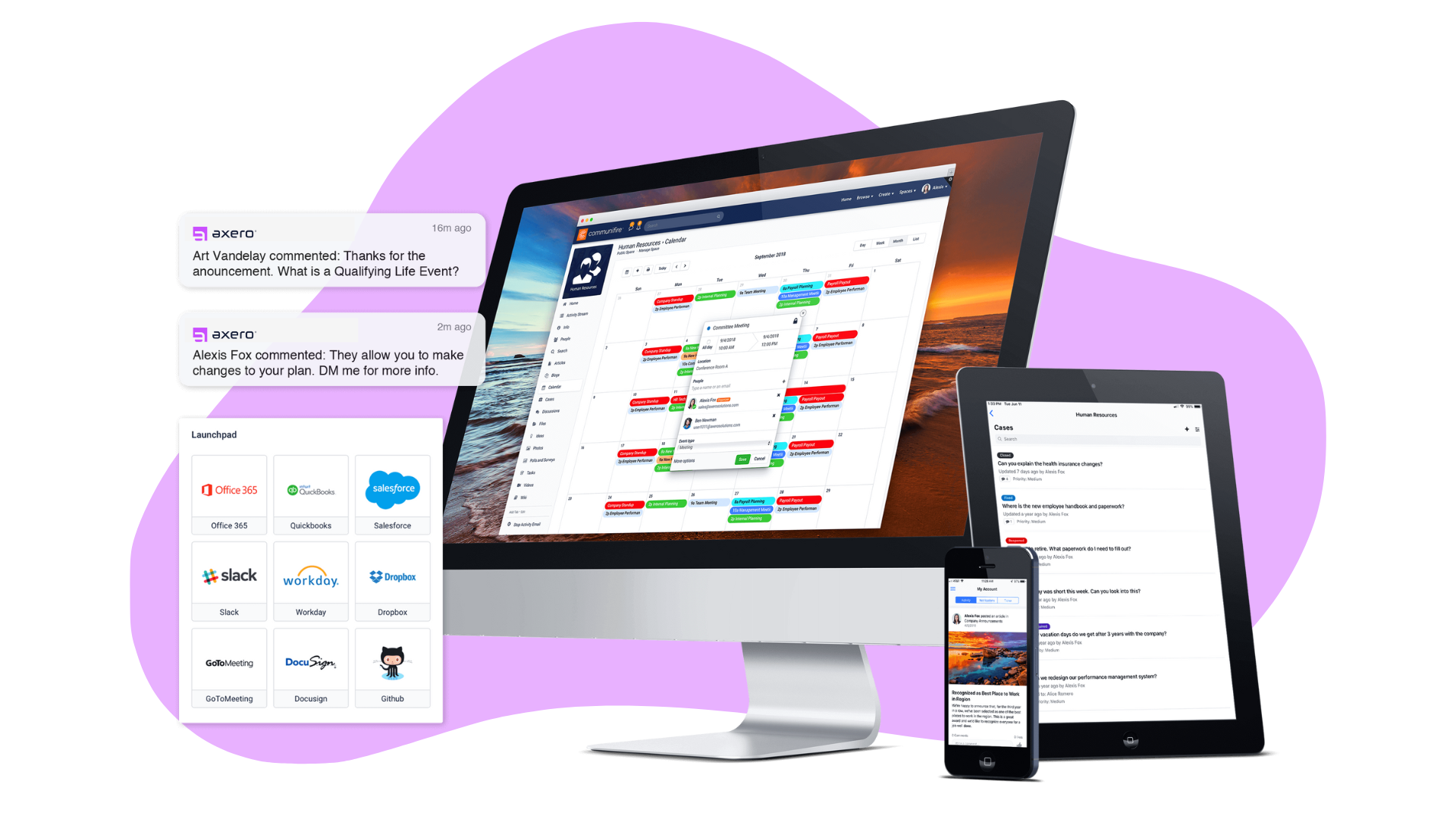There are two types of people in this world: those who love team building and those who loathe it. Either way, it isn’t easy to think about employee engagement without it.
Truth is, team dynamics don’t just happen by accident. They require intentional interventions to build and strengthen bonds and bridge gaps. Team-building activities, with real thought and intention, can do just that. These activities also give hybrid teams and small groups a fun way to work on problem solving and improved communication.
With only 22% of American employees describing their team as the “best” they have worked in, that leaves a lot of room for improvement. This is where team building can help create a stronger company culture.
What is team building?
We believe Longman Business Dictionary* provides a pretty clear definition of team building:
The process of getting employees to work together well and communicate effectively.
Building on that, team building tends to take place in a low-stakes environment and leverages gamification, allowing individuals to learn from and with each other in order to better collaborate. It can mean anything from an impromptu board game after work to an official company-wide hackathon in a conference room, and everything in between.
For hybrid teams, it often looks like virtual team building activities or online scavenger hunts that get people talking. For in-person teams, it can mean small groups working on problem solving or trying two truths and a lie as an icebreaker. Either way, the goal is to strengthen communication skills, foster creativity, and build a collaborative environment that supports improved communication.
If not done correctly, team building can be seriously cringe and, worse, can drive people apart rather than unite them. This is why it’s important to actually apply a framework and provide reasoning for it. We find Daria Rudnik’s CLICK framework to be highly useful for creating team building with meaningful and lasting results:
Benefits of team building activities for work
9 in 10 employees reported being part of a team at work. Even freelancers still need to work with clients to deliver successful projects. The point is, it’s inevitable that most of us, if not all, will work as part of a team.
Team building done right can provide a host of benefits to individuals, small groups, hybrid teams, and the organization at large. The result is better team dynamics, improved communication, and a stronger company culture.
Increased productivity
Corporate team building activities have, unfortunately, a reputation for being, to quote workplace forums across the web, “a total waste of time.” At times, team building may feel unnecessary and disruptive to the workweek, especially when competing deadlines already have us throwing our hands in the air, “Where has the time gone!?”
Your typical day at work should not feel like keeping your head down and just getting work done. Sure, work is work, but don’t forget that we are all human and, whether you like it or not, we bring a lot of ourselves to work. That is, it’s equally important to set aside some time to actually get to know your colleagues and learn how to communicate, collaborate, or even negotiate with and among each other. And this is exactly where team building enters.
Team building activities can naturally surface individuals’ strengths, gaps, communication styles, and preferences at work in a low-pressure, often fun environment. More importantly, it allows you to see your colleagues, and vice versa, beyond job titles and as individuals with their own quirks and uniqueness. This very understanding forms the foundation of stronger workplace relationships, which have a direct impact on overall employee productivity.
Higher team morale
If there’s one thing and one thing only that team building should help you achieve, it should definitely be higher team morale. Team morale, in the simplest terms, is the attitude employees have towards their team and the work they do. When every day starts to feel the same, it’s easy for people to slip into a rut, and that rut can make it harder to try new things or stay motivated.
Team building activities are often goal-oriented, much like the nature of most team dynamics. When employees come together to work towards a shared goal, it reinforces the idea that everyone contributes to something bigger than themselves, and that shared success can actually feel pretty great. In fact, 61% of leaders felt team morale improved after participating in team building activities.
Boosted employee engagement
Gallup surveys show that having best friends at work is a key factor in employee engagement and job success. This comes as no surprise. When employees don’t feel connected, united, or part of a group, loneliness and isolation can creep in, and it’s only a matter of time before they withdraw and disengage from their work.
Effective team building activites are a great way to strengthen employee engagement and foster connections. When employees develop relationships at work, they feel a sense of belonging not only to their colleagues but also to the broader organization as a whole. And, you guess it, when people feel like they belong, they engage.
Greater innovation
In a grit-your-teeth-and-get-on-with-it workplace environment, employees are rarely given space to innovate. Contrary to popular belief, creativity doesn’t just happen; it is cultivated.
Team building provides that space. Small groups can experiment with fun themes, share new skills, and foster innovation. Hybrid teams benefit from virtual team building activities, while in-person groups might thrive in creative problem solving sessions like a scavenger hunt. The outcome is improved communication and fresh ideas.
For example, pharmaceutical giant Pfizer sees new solutions to some of their biggest business challenges, including recovering millions in overlooked rebate funds by developing a company-wide deposit portal*, from their team building event “Dare to Try” that encourages employees to “develop new ideas, take thoughtful risks through experimentation, and ignite change*.”
Happier teams!
Above all else, team building activities should be fun! After all, what lifts team spirits more than a good time? When the focus is on enjoyment, everything else, such as improved communication, deeper trust and morale, and team cohesion, naturally follows. Do not underestimate the power of employee happiness. With the right team building activities, fun takes center stage, and the benefits are just a bonus.
22 Best team building activities for work
Remember the CLICK framework? When choosing team building exercises, aim for ones that strengthen the areas your team actually needs support in.
To really hit the mark, make sure your team building activities:
The best team building games are fun, creative, and energizing without exhausting and patronizing employees. And the following team building activities will do exactly that.
1. Find your people
Everyone starts in the middle of the room. Each corner of the room is labelled A, B, C, and D, to correlate to a different “people type.” For each round, employees go to the corner of the room associated with their personal interest. The first round might, for example, be:
A – Dog people
B – Cat people
C – Rabbit people
D – People indifferent to animals
Once arriving at their corner of the room, everyone talks about the subject they have in common. The rounds repeat with different themes, like food, movie genres, and so on.
2. Story building
Employees sit in a circle, storytime style. In this case, the story is told by everyone! One person begins, starting a made-up story however they like. At a point of their choosing, they pause, allowing the next person in the circle to take over. Players can say anything from one word to three sentences.
This game allows the enthusiastic types to let loose while the more reticent ones can just say a word or two, while still being part of the process of building a story. It’s a great exercise in creative thinking as a team, often to hilarious results!
3. Charades
You can’t go wrong with a classic. Charades is a miming game in which one player uses actions to portray a book, movie, play, or song. Everyone else needs to compete to guess what they are miming, with the winner of each round becoming the next charade actor. This can be conducted as a team competition or with individuals, depending on the number of players.
4. Fish bowl
Everyone in the room receives a few scraps of paper (usually only 1-2 per person for larger groups and 4-5 for smaller groups). On each scrap of paper, players must write a name; whether a title, character, or name of a person is their choice. All the scraps of paper are folded and placed in a fish bowl (though any bowl will do). Everyone is then split into two teams.
In each round, players from opposing teams take turns to describe as many names as possible within one minute. They can move on to the next scrap of paper when their team has either successfully guessed or they choose to “pass,” in which case the paper is returned to the bowl.
Each consecutive round increases in difficulty, from describing, to using only one word, to miming. Want bonus rounds? Try getting your players to only use sound effects or facial expressions.
5. The artifact exercise
The artifact exercise sounds fancy. In reality, it’s a glorified show-and-tell. Employees bring in objects that they are proud of, perhaps items that showcase life achievements, and tell the office about them. This is an easy one to conduct online or in hybrid setups.
If you want a bit of a twist, instead of showcasing a prized possession, we see a myriad of absolutely hilarious videos of people bringing the most random object to work. Who knows? Bob in HR might also be a proud owner of an Australian didgeridoo like Patrick from the BMW Dealership in O’Fallon here!
@newboldbmw Bringing a random object from home to work 😂😭 Honestly, we didn’t know what to expect but we really didn’t expect THIS #creatorsearchinsights #bmw #dealershiplife #carsales #cardealership #randomthings #randomobjects #challenge #workhumor #reaction #stl
6. Two truths and a lie
Two truths and a lie is a quick icebreaker that encourages conversation. Each person shares three statements: two truths and one lie. The rest of the group has to guess which is which.
This activity works well in small groups and creates space for laughter, new skills in storytelling, and improved communication. For hybrid teams, it’s easy to play virtually as part of a meeting or other virtual team building activity.
7. Office trivia
In a personalized trivia night, team members learn new and interesting facts about each other. Prior to the event, employees send in personal trivia (of course, items they don’t mind being shared with the group), which is then turned into a quiz to be answered in teams. Intranet platforms are a failsafe way to collect and organize this kind of info. If you have a hybrid team, you can even turn it into an online quiz and conduct the trivia night remotely!
8. Scavenger hunt
A scavenger hunt is a classic choice for team building. It promotes collaboration, problem solving, and improved communication while keeping things fun. Small groups can split up and race against each other to find hidden items.
This activity works equally well for hybrid teams—virtual team building activities can include photo challenges or digital hunts, giving everyone a fun way to participate.
9. Going out for a meal or drinks
An online food delivery app Just Eat found that team lunches are the most favorite team building activity among employees. It’s simple, enjoyable, and fulfilling (literally). And with 38% of employees saying they don’t feel encouraged to take a lunch break, treating the team to one every now and then can go a long way.
10. Memory wall
If you want to get some positivity flowing, memory wall is the activity for you. Each team works together to write or draw positive workplace-associated memories. It could be anything from the satisfaction of getting a project over the line to a funny anecdote from last year’s Christmas party. Through powerful reminders of quality interactions, this one works to strengthen team bonding.
11. Escape room challenges
Escape rooms work wonders for problem-solving, with teams racing to solve clues that lead to the key out of a locked room. If being physically trapped in a room with competitive colleagues doesn’t sound fun to your team members, try a virtual escape room instead. You get all the mystery without the tension, and can include working remote team members in the game.
12. Group classes
Group classes are super easy to organize, especially with hundreds, if not thousands, of options readily available to book out there. Whether it’s a puppy yoga session, a game of bowls, or a cooking class, these structured environments where team members follow an instructor together can foster team cohesion while easing the pressure and anxiety that can often come with team building activities.
13. Community service
No one can say, “What’s the point in this?” when doing community service. Whether helping out at a soup kitchen or partaking in a trash cleanup, there’s nothing quite like bonding over an activity done for the greater good.
14. Creative challenges
From pottery and painting to cocktail masterclasses, creative challenges help your team strengthen their problem-solving skills. Unlike the traditional “build a tower” team-building cliché, honing real, non-competitive creative skills feels more meaningful and far less patronizing.
15. Murder mystery
Now for a little theatre. Who doesn’t like a cozy mystery? In a murder mystery party, group members must use strategic thinking to work out who committed a fictional murder. No one is left out, with each person being given a character to “act,” anything from a washed-out starlet to a New York gangster. The more dramatically inclined can improvise if they like, while others have the option to follow a script.
16. Desert island game
Desert island is a fun and lighthearted way for coworkers to get to know each other better. Going round the circle, each person says the three things they would take with them if they were stranded on a desert island. This one can be done in person or with a remote team.
17. Reverse brainstorming
You have a challenge. What’s the quickest route to failure? In this out-of-the-box game, the mission is to send a project straight down the road to disaster. Taking “there are no wrong answers” to the next level, reverse brainstorming is magic for unblocking creativity. It’s also a chance for team members to be a little silly and show off their personalities underneath the corporate shine.
18. Compliment circle
This is a cute one. Compliment circle is exactly what it sounds like: everyone goes around the circle complimenting the person to their left or right. Receiving encouragement has a direct impact on motivation levels in the workplace, with 7 in 10 employees saying that they feel connected to high-recognition workplace cultures. Why not integrate it into regular team-building practices, with employee recognition practices?
19. Book club
A book club is a fun way for small groups to dive into fresh ideas while strengthening company culture. Hybrid teams can join virtually, making this one of the more flexible virtual team building activities.
Employees gain new skills through discussion, practice improved communication, and engage in problem solving around themes and takeaways. It’s an easy way to create a better team connection.
20. Nature retreat
Go green with a nature-based work outing. This could be a day out for a bushcraft course in the woods, or a weekend corporate retreat at the beach. If you want to spark some friendly competition, you could split coworkers into teams to see who can build the best shelter or start a fire the fastest.
21. “Show me your setup” challenge
A fun peek into people’s home working lives! Team members share a photo or video of their home office setup, with competition categories like “Coziest Setup,” “Most Ergonomic,” or “Most Creative.” You can easily host this on your company intranet via social feed or gallery, allowing the teams to vote via emoji reactions or a quick poll.
22. Hot take debate session
Encourage spirited (but friendly!) debate on harmless, funny, or niche topics, think:
Split into pairs or small teams, allow five minutes for prep time, and then let the debate begin!
Team building activities to AVOID
Surely, you wouldn’t want your team-building event to make front-page news for the wrong reasons, like that infamous office retreat in Colorado, where an employee was left stranded in the mountains, right?
While hiking getaways might not be everyone’s cup of tea, here are a few of the most overused team building activities you will want to skip, well, unless your goal is more eye-rolls than team bonding.
1. Trust falls
Oh, the infamous trust falls. Participants are split into pairs, with one of the two forced to fall backwards into their colleague’s outstretched arms. It’s like a Titanic reenactment, except instead of “I’m flying, Jack!”, you are falling flat, and it’s your manager who dropped you. Super awkward, even before you hit the floor.
2. Truth train
Otherwise known as “how to make your employees hate each other,” truth train is a game that requires each member of the group to say what they don’t like about each other. Supposedly, this game is about cultivating honesty and teaching teams to navigate conflict. More likely, it will end in tears. It’s a HARD NO from us!
3. Intensive physical activities
Fresh air, communication, and team problem solving. Physical activities like hiking or baseball sound like they have all the ingredients for a solid team building session. One problem: they are notorious for exclusion.
Those with disabilities, health problems, or lower fitness levels may be unable to take part. If they do get involved, they could end up left behind or chosen last for teams. Go for something more inclusive, and get the entire group on board.
4. Human knot
Unwanted touching? No thanks. Participants stand in a circle, then grab their colleagues’ hands in the middle to create a “knot,” out of which they must untangle themselves. We are certain there are better ways to improve workplace communication, without Brian’s armpit in your face.
5. Memory name game
You introduce yourself. The next person introduces themselves and also introduces you. The one after introduces themselves, and the two people before. And on and on until everyone has been introduced fifty million times. If your team is the kind that enjoys watching paint dry, they will love this. You will be wishing you’d just bought name badges.
Set up your team building for your team’s success
Team building events may only last an afternoon, but when shared on your company intranet feed or recognized in a peer-to-peer shoutout, the positive impact is felt for weeks.
With Axero as your digital hub, you can coordinate activities, share photos, and keep the feel-good going, long after your team building is over.






























 info@axerosolutions.com
info@axerosolutions.com 1-855-AXERO-55
1-855-AXERO-55


